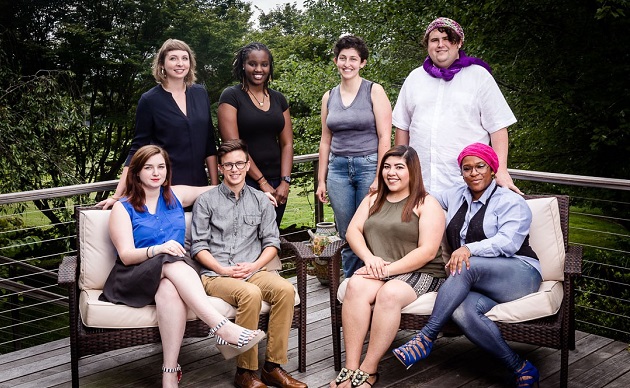
The Tzedek Social Justice Fellowship (TSJF) is a unique one-year paid career and community development opportunity for emerging nonprofit and social justice leaders interested in becoming resilient agents of change in their communities. Through the Tzedek program, fellows explore how discrimination based on class, gender, sexuality, faith traditions, and ethnicity intersect in our lives, community, and society while developing the skills needed to become strong and effective community activists, allies, and leaders.
Visit the Tzedek Fellowship website to learn more
Current Fellow at the Center for Diversity Education

Hannah James was born and raised in Raleigh, North Carolina. From a young age, she felt called to do social justice and advocacy work. Hannah has been living in Asheville since 2012 when she began studying sociology and economics at UNCA. While in school, Hannah was hired as the manager of a federally funded local food research project based in the UNCA Department of Economics, where she gained invaluable management, budgeting, and organizational experience while developing a growing passion for research. In 2014, she became a co-founder of Girls Rock Asheville, a nonprofit music and social justice education summer camp for girls and trans youth. She currently serves as Treasurer on Girls Rock Asheville’s Board of Directors. In 2016, Hannah completed an original undergraduate research project titled “Community Engagement in Place-Based Social and Economic Development: A Case Study of The Wild Ramp,” which she has presented at multiple conferences. It is due to be published in NCUR’s Fall 2016 journal. Hannah graduated from UNCA in May of 2016 and was ecstatic to be hired a month later as the Tzedek Social Justice Fellow at The Center for Diversity Education. Hannah is passionate about using education, advocacy, and mixed research methodologies to dismantle systems of oppression. When she isn’t working or volunteering at local nonprofits, Hannah is an avid thrift shopper, animal snuggler, and her two younger sisters’ biggest fan.
About the Fellowship
Learning Initiatives and Focal Areas
With an emphasis on LGBTQ Rights and combatting Anti-Semitism, TSJF creates a space for fellows to actively explore how discrimination based on class, gender, sexuality, faith traditions, and ethnicity intersect. We look through an intersectional lens at our own lives, our community, and our society. During Orientation, each fellow explores and identifies their overall goals for the year ahead and for their overall long-term career path. Fellows then work with staff and community mentors to create individualized action plans for developing the skills they need to accomplish their goals and become strong and effective community activists, allies, and leaders.
Training and Development Strategy
The TSJF model of training focuses primarily on four interwoven avenues of learning:
• Fellowship-Based Learning and Co-Learning
• Individualized Instruction and Guidance from Local and National Thought-Leaders and Activists
• Applied Learning at Local Organizations
• Independent Study and Practice
Learn about applying to be part of the 2017-2018 Tzedek Fellowship.
Partner Organizations and 2016-2017 Cohort
Education + Action = Change

Effective community organizing and social justice work is strongly rooted in being proactive, taking action, and encouraging those around you to educate themselves and their communities. After education and investigation, communities will be equipped to take powerful actions of their own to inspire and implement change.
Fellows spend 75% of their time practicing putting their newly honed skills as into action as full-time professional employees at their partner (host) organization. TSJF is proud to partner with a group of the most active nonprofit organizations and educational institutions in the Greater Asheville area. TSJF partner organizations are diverse in their size, operational methods and workstyles, clients and audiences, and the injustices that inspire them to act. Through participation in TSJF, organization staff and fellows have opportunities to build relationships with community leaders, educate each other about specific community issues, and build strong, action-based bridges at the points where they intersect.
In addition to The Center for Diversity Education, the Tzedek 2016-2017 cohort includes the following host organizations:
Center for Participitory Change





